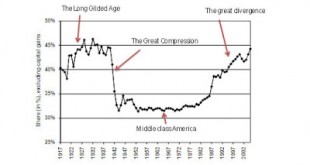So Krugman continues to argue that Friedman's calculations are implausible. Well sure. But that's the point to some extent as Galbraith discussed here. The Plan involves huge (read yuge; wink, wink, nudge, nudge) spending, and it should have almost by definition implausible results looking from the perspective of recent history. Imagine the implausible effect that Social Security had on old age poverty. Or the incredible reduction in inequality that the New Deal policies had.If you were in...
Read More »Jamie Galbraith’s response to the critics of Gerald Friedman’s paper on the impact of Bernie Sanders policies
There has been a debate following the NYTimes piece on left of center economists against Bernie Sanders. Doug Henwood replied here and Dean Baker here. Henwood does not discuss the Gerald Friedman paper that led to the whole discussion. Now Jamie Galbraith provided a nice reply to the left of center economists that suggested that Bernie's plans are not realistic. He says: "What the Friedman paper shows, is that under conventional assumptions, the projected impact of Senator Sanders'...
Read More »James Galbraith on the European Crisis
<br /> Lecture at the Renner Insitute in Vienna, October 6.
Read More »Angus Deaton wins the Sveriges Riksbank Prize in Economic Sciences in Memory of Alfred Nobel
For his work on "consumption, poverty and welfare" according to the press release. It wasn't Atkinson, for inequality, as I suggested it was possible, but given the other possibilities cited this is quite good. Deaton had received last year the Leontief prize, which usually goes to heterodox economists (the other Nobel to win the Leontief was Sen), together with Jamie Galbraith.I should say, I recently read his The Great Escape. An interesting book, full of relevant data. But it does...
Read More »Galbraith on the plan B for Greece
Slow (really slow) posting this summer. Here a few links to Jamie's role on the Greek Ministry of Finance Working Group convened by Varoufakis. Here he clearly says that: "At no time was the Working Group engaged in advocating exit or any policy choice. The job was strictly to study the operational issues that would arise if Greece were forced to issue scrip or if it were forced out of the euro." So it was a plan B in case of Grexpulsion, not a tactical negotiation tool or a threat of...
Read More »Greece, Europe, and the United States
"A progressive Europe—the Europe of sustainable growth and social cohesion—would be one thing. The gridlocked, reactionary, petty, and vicious Europe that actually exists is another. It cannot and should not last for very long."By James K. GalbraithThe full brutality of the European position on Greece emerged last weekend, when Europe’s leaders rejected the Greek surrender document of June 9, and insisted instead on unconditional surrender plus reparations. The new diktat—formally accepted by...
Read More »Galbraith on the Greek referendum
The paper cited, 9 Myths about the Greek Crisis, is available here.
Read More »Greece Has Made Tough Choices. Now It’s the IMF’s Turn
By James K. GalbraithThe International Monetary Fund's chief economist, Olivier Blanchard, recently asked a simple and important question: "How much of an adjustment has to be made by Greece, how much has to be made by its official creditors?" But that raises two more questions: How much of an adjustment has Greece already made? And have its creditors given anything at all? In May 2010, the Greek government agreed to a fiscal adjustment equal to 16 percent of GDP from 2010 to 2013. As a...
Read More » Heterodox
Heterodox

